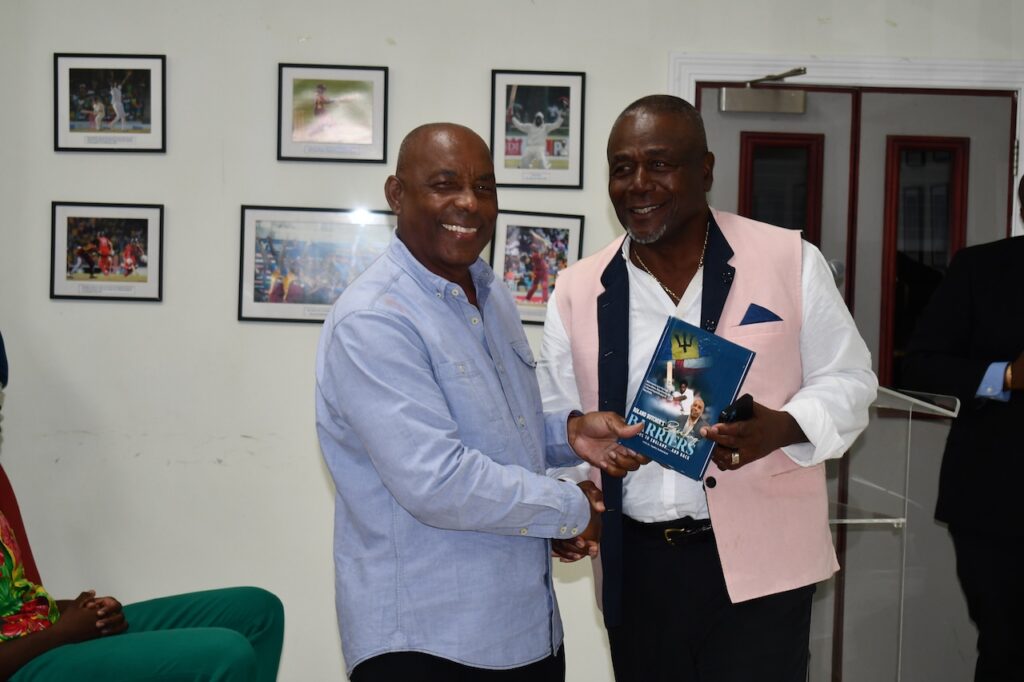Barbados-born cricket legend Roland Butcher officially launched his memoir, Breaking Barriers: Barbados to England and Back, on Wednesday at the 3Ws Pavilion, University of the West Indies (UWI) Cave Hill Campus.
The evening celebrated Butcher’s remarkable journey from local pitches in Barbados to becoming the first Black man to play Test cricket for England.
The event, hosted by sports journalist Barry Wilkinson, featured tributes, readings, and a spirited verandah chat with Butcher and his co-author Dr Sasha Sutherland. The night also included reflections on Caribbean cricket’s past and future with West Indies batting legend Dr The Most Honourable Desmond Haynes.
In his remarks, Butcher reflected on the journey chronicled in his book. He stated that his generation played for the love of the game and not for money.
Bringing to light the struggles of playing abroad in the 80’s, Butcher showed appreciation to his wife Cheryl Butcher and her support during those times.
“It was fantastic. She was the rock. She looked after the children and we have been together since 1976. We have had a fantastic life and my grandson is testament to that,” he said.
British High Commission Chargé d’affaires Charley Williams applauded Butcher’s legacy, noting the significance of his contributions to both English and Caribbean cricket. “Your first match represented the breaking of barriers, the bridging of cultures and deepened the connection between two countries, Barbados and England.”
Regarding the hardship and racism that Butcher faced in England, Williams contended that England had changed.
“Roland and I would agree that the country has come a long way since then. It is a much more dynamic and multicultural place and it is all the better for it. In part because of many of the diaspora communities and in particular, the West Indian migrants, who blazed a trail for the arts, music and sport. Barbadians have helped to shape modern Britain,” she explained.
Professor Clive Landis, Pro Vice-Chancellor and Principal of UWI Cave Hill Campus, emphasised the importance of documenting sporting history and the role institutions like UWI play in preserving regional legacies. Landis also highlighted that Butcher was a history maker and is well known at the campus, but the esteemed people that wrote in the forward of the book, showed the respect that he had from legends in cricket history, including Sir Garfield Sobers, Michael Holding and Haynes.
Dr Sutherland, co-author of the book, highlighted how Butcher’s story spoke to the challenges of professional sport. She also proudly outlined the successes of the UWI in sport and how the various programs including the cricket club for girls founded by Butcher had grown from strength to strength.
Sutherland also spoke to the humility of Butcher and in response the former cricketer explained that it was based on his upbringing.
Butcher also showed appreciation to Dr Sutherland for the fire she had for sport and the development of women in sport. He explained that the book came about through the encouragement of Sutherland.
Their conversation during the “Verandah Chat” explored the struggles and triumphs Butcher faced as a trailblazer in a changing cricketing world.
Paul Butcher, Roland’s son, contributed a heartfelt video dedication, adding a personal layer to the evening’s narrative. West Indies Women’s Cricket player Hailey Matthews and Romel Currency were also among those who offered video tributes.
The launch closed with a Q&A session on the current state of West Indies cricket, led by Butcher and Haynes.
Asked about the future of regional cricket, Butcher expressed cautious optimism. “The talent is here; what we need is the structure, support, and belief to match it.”
(AS)
